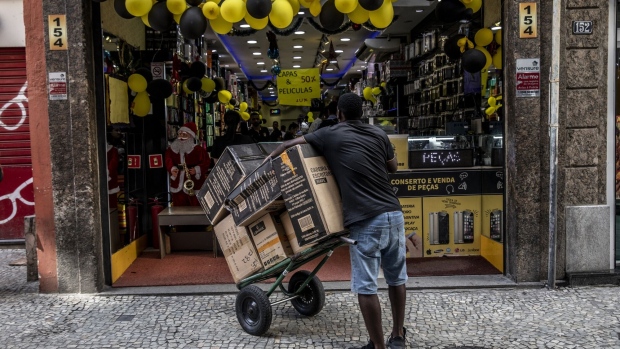May 28, 2023
Brazilian Households Default Grow Amid High Interest Rates
, Bloomberg News

(Bloomberg) -- Brazilians are struggling to pay their debts on time, with four out every ten adults facing default, as central bankers keep monetary policy tight in an effort to bring inflation back to their target.
Overdue debts grew 18.42% in April from a year ago, according to data from the national confederation of shopkeepers reported by news site Poder360. The number of Brazilians facing default also grew around 8%, with most battling debts with local banks, the confederation said.
Household debt in Brazil has lingered around all-time highs for months, according to data from the central bank. Policymakers led by Roberto Campos Neto have pinned the benchmark Selic rate at 13.75%, after a dozen rapid-fire hikes, trying to ease price pressures. Nine months into the strategy, headline inflation slid to around 4% by mid-May from last year’s peak of 12%.
Read More: Lula Lashes Out and Sends Warning to Central Bankers Everywhere
Indebtedness is also growing among the elderly. Default rates among Brazilians above 60 years old grew almost 35% in April from the same period in 2019, according to data by corporate-data analysis firm Serasa Experian published by newspaper Estado de Sao Paulo. In comparison, overdue debts among Brazilians from all ages grew around 13% on average.
High costs of borrowing are also hurting businesses that struggle to finance loans amid rising corporate bankruptcies. Signs of a credit squeeze have emerged, with costlier local debt markets and new issuance — in both domestic and international capital markets — plunging.
Traders are increasing their bets for an easing cycle beginning in August, after central bank chief Campos Neto said there are “positive signs ahead” on the inflation outlook. Global activity is cooling off, with falling commodity and energy prices, he said. On top of that, core measures stripping out energy and food prices, “came in better” than expected in mid-May.
Read More: Brazil Central Bank Sees Inflation Improving, Fans Rate Cut Bets
Still, analysts see consumer price increases picking up again by December, and above the monetary authority’s 3% goal all through 2025. Most bet the benchmark rate won’t fall below 10% until 2025.
©2023 Bloomberg L.P.





